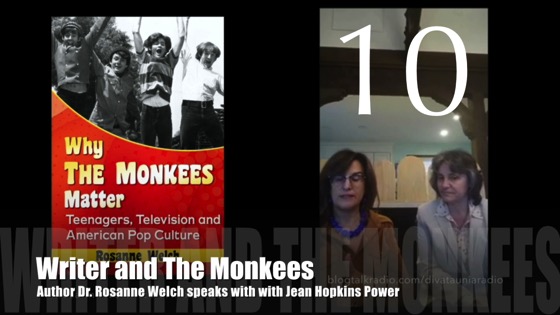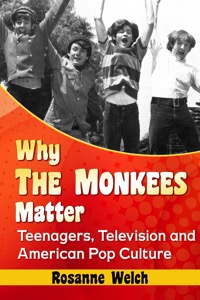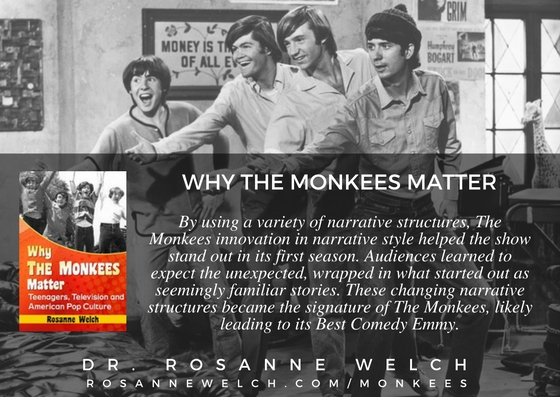Rosanne Welch talks about “Why The Monkees Matter” with Jean Hopkins Power
Watch this entire presentation (45 mins)
Jean Powergirl takes the host reigns and welcomes her guest Rosanne Welch, PhD to the show! They’ll be discussing Roseanne’s book, “Why The Monkees Matter: Teenagers, Television and American Pop Culture.”

Transcript:
Jean: So The Monkees are going strong now did they evolve in their message over these 52 episode?
Rosanne: 58 Episodes
Jean: 58 Episodes. All right. So they start out, did they change up what they were doing? I mean you’re the connoisseur of all the episodes.
Rosanne: They had a variety of messages and these come form the writers experiences. One of the things I push in my class is that we have to remember that we tend, in American, because the French taught us, to correlate the author of the piece with the director, but, in fact, the director can’t direct a bunch of blank pages. It’s the writer who comes up with the theme and the idea. The director enhances that through the visuals. So, for me, it was important to meet the various writers who I still could and it’s their thoughts and messages.
A hit television show about a fictitious rock band, The Monkees (1966-1968) earned two Emmys–Outstanding Comedy Series and Outstanding Directorial Achievement in Comedy. Capitalizing on the show’s success, the actual band formed by the actors, at their peak, sold more albums than The Beatles and The Rolling Stones combined and set the stage for other musical TV characters from The Partridge Family to Hannah Montana. In the late 1980s, the Monkees began a series of reunion tours that continued into their 50th anniversary.
This book tells the story of The Monkees and how the show changed television, introducing a new generation to the fourth-wall-breaking slapstick created by Laurel and Hardy and the Marx Brothers. Its creators contributed to the innovative film and television of 1970s with projects like Bob & Carol & Ted & Alice, The Mary Tyler Moore Show, Laugh-In and Welcome Back, Kotter. Immense profits from the show, its music and its merchandising funded the producers’ move into films such as Head, Easy Rider and Five Easy Pieces.
Rosanne Welch, PhD has written for television (Touched by an Angel, Picket Fences) and print (Three Ring Circus: How Real Couples Balance Marriage, Work and Kids and The Encyclopedia of Women in Aviation and Space). In the documentary world she has written and produced Bill Clinton and the Boys Nation Class of 1963 for ABC NEWS/Nightline and consulted on PBS’s A Prince Among Slaves, the story of a prince from West Africa who was enslaved in the 1780s, freed by order of President John Quincy Adams in the 1820s and returned to his homeland.
Podcast: Play in new window | Download
Subscribe: RSS



![Commentary, Comedy, and The Monkees from Why The Monkees Matter Book Signing [Video] (1:01)](https://rosannewelch.com/wp-content/uploads/2017/07/wtmm-reading-13-commentary.jpeg)
![09 : Only 2 Seasons : “Why The Monkees Matter” Interview with Jean Power [Video] (1:11)](https://rosannewelch.com/wp-content/uploads/2017/06/rmw-power-09-only-2-seasons.jpeg)
![Vietnam War and The Monkees from Why The Monkees Matter Book Signing [Video] (0:48)](https://rosannewelch.com/wp-content/uploads/2017/06/wtmm-reading-12-politics.jpeg)


![08 : TV vs. Movies : “Why The Monkees Matter” Interview with Jean Power [Video] (1:03)](https://rosannewelch.com/wp-content/uploads/2017/06/rmw-power-08-tv-movies.jpeg)

![07 : Mary Tyler Moore and The Monkees : “Why The Monkees Matter” Interview [Video] (0:40)](https://rosannewelch.com/wp-content/uploads/2017/06/rmw-power-07-mary-tyler-moore.jpeg)